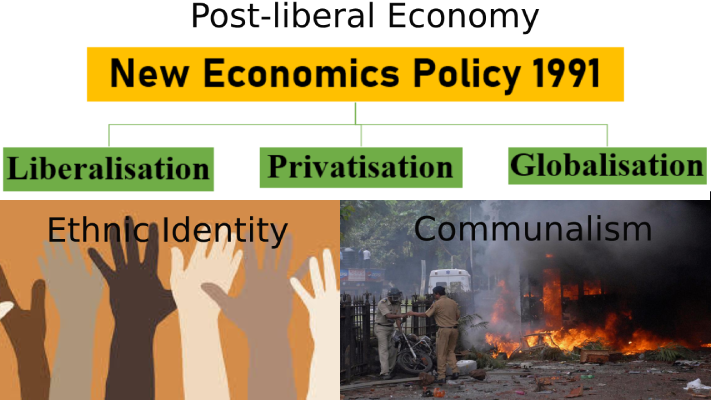The post-liberal economy in India, characterized by economic liberalization and globalization since the early 1990s, has had significant impacts on ethnic identity and communalism. These impacts are complex and multifaceted, influencing social dynamics in both positive and negative ways.
Positive Impacts:
- Economic Opportunities and Mobility: Economic liberalization has led to increased opportunities for employment and entrepreneurship. This has allowed individuals from various ethnic and communal backgrounds to improve their socio-economic status, potentially reducing economic disparities and tensions.
- Urbanization and Social Integration: The growth of urban centers has fostered greater social integration. People from diverse ethnic and communal backgrounds live and work together in urban areas, leading to increased interactions and understanding, which can reduce prejudices and promote social cohesion.
- Rise of a Middle Class: The expansion of the middle class has created a more diverse socio-economic landscape. As economic success becomes a more significant marker of identity, ethnic and communal identities may become less pronounced.
- Consumer Culture and Global Influences: Exposure to global cultures through media, technology, and travel has led to a more cosmopolitan outlook among many Indians. This can lead to a dilution of traditional ethnic and communal identities as people adopt more global lifestyles and values.
Negative Impacts:
- Economic Inequality: While liberalization has led to overall economic growth, it has also resulted in increased economic inequality. Marginalized communities may feel left out of the benefits of economic growth, exacerbating feelings of resentment and leading to communal tensions.
- Competition for Resources: Economic liberalization has intensified competition for limited resources such as jobs, education, and land. This competition can be framed along ethnic and communal lines, leading to conflicts and communal violence.
- Politicization of Identities: In the post-liberal economy, political parties and leaders may exploit ethnic and communal identities for electoral gains. This politicization can heighten communal sentiments and lead to polarization.
- Cultural Anxieties: Rapid economic and social changes can lead to cultural anxieties among certain groups. These anxieties can manifest in a resurgence of ethnic and communal identities as people seek to preserve their traditional ways of life against perceived threats.
- Regional Disparities: Economic liberalization has often benefited urban and industrialized regions more than rural and less developed areas. This regional disparity can fuel ethnic and communal grievances, particularly in regions that feel left behind.
- Identity-Based Movements: The economic changes brought by liberalization have sometimes spurred identity-based movements. Groups may mobilize around ethnic and communal identities to demand greater economic opportunities or autonomy, leading to increased communalism.
Case Studies and Examples:
- Communal Riots: The economic changes in post-liberal India have been accompanied by periodic outbreaks of communal violence, such as the 2002 Gujarat riots. Economic grievances and competition for resources can exacerbate underlying communal tensions.
- Reservation Debates: The demand for reservations in jobs and education for various ethnic and communal groups has intensified in the post-liberal economy. The agitation by the Jat community in Haryana and the Patidar community in Gujarat for reservations are examples of how economic liberalization has influenced identity politics.
- Northeast India: In regions like Northeast India, economic liberalization has sometimes led to increased ethnic tensions as indigenous communities compete with migrants for resources and opportunities.
Conclusion:
The post-liberal economy has had a profound impact on ethnic identity and communalism in India. While it has created opportunities for greater social mobility and integration, it has also led to increased economic inequalities and competition for resources, which can exacerbate ethnic and communal tensions. The interplay between economic changes and identity politics continues to shape the social fabric of India in complex ways.


